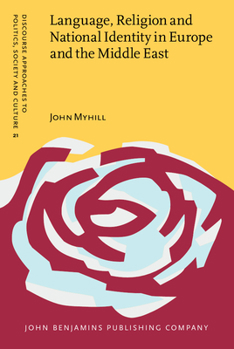Language, Religion and National Identity in Europe and the Middle East: A Historical Study
(Book #21 in the Discourse Approaches to Politics, Society and Culture Series)
This book discusses the historical record of the idea that language is associated with national identity, demonstrating that different applications of this idea have consistently produced certain types of results. Nationalist movements aimed at 'unification', based upon languages which vary greatly at the spoken level, e.g. German, Italian, Pan-Turkish and Arabic, have been associated with aggression, fascism and genocide, while those based upon relatively homogeneous spoken languages, e.g. Czech, Norwegian and Ukrainian, have resulted in national liberation and international stability. It is also shown that religion can be more important to national identity than language, but only for religious groups which were understood in premodern times to be national rather than universal or doctrinal, e.g. Jews, Armenians, Maronites, Serbs, Dutch and English; this is demonstrated with discussions of the Holocaust, the Armenian Genocide, the civil war in Lebanon and the breakup of Yugoslavia, the United Netherlands and the United Kingdom.
Format:Hardcover
Language:English
ISBN:902722711X
ISBN13:9789027227119
Release Date:June 2006
Publisher:John Benjamins Publishing Company
Length:300 Pages
Related Subjects
Language ArtsCustomer Reviews
0 rating





